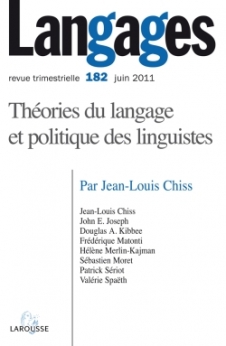
Langages n° 182 (2/2011)
Pour acheter ce numéro, contactez-nous
Recevez les numéros de l'année en cours et accédez à l'intégralité des articles en ligne.
Le livre de V. Volosinov Marxisme et philosophie du langage (1929), faussement attribué à M. Bakhtine, a suscité des réactions contradictoires. Un des multiples paradoxes entourant ce livre est que c’est en Occident qu’il a eu le plus de succès, vint-cinq ans avant sa republication en Russie, où il avait été totalement oublié depuis le début des années 1930. C’est l’interprétation de l’adjectif « marxiste » qui fait ici problème : massivement lu comme un livre « marxiste » dans le monde occidental, il est considéré comme un livre « anti-marxiste » dans la Russie post-soviétique. C’est tout le rapport du langage, de l’idéologie et du groupe social qui est repensé dans cet article, à la lumière d’une interrogation sur les méthodes de traduction de l’apport de l’Europe orientale à la réflexion sur le langage.
V. Volosinov’s book Marxism and the philosophy of language (1929), wrongly attributed to M. Bakhtin, gave rise to contradictory reactions. One of the many paradoxes that surounded the book is that it is in the West that it has been the most successful, twenty-five years before its new publication in Russia, where it had been totally forgotten since the beginning of the 1930s. What is at stake is the understanding of the word “Marxist”: generally read as a “Marxist” book by Western intellectuals, it is on the contrary considered as an “anti-marxist book” in post-Soviet Russia. This paper tries to cast a new light on the relationship between language, ideology and social groups, by examining the methods of translation of the reflexions on language in Eastern Europe.